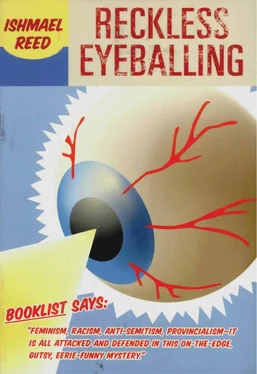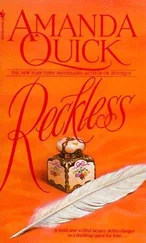She knew her business. He had a tendency to tell rather than show, and she was teaching him the art of description. The art of movement. The art of character differentiation. She had recommended some minor changes in the script, having mostly to do with his tendency toward lengthy dialogue (Brashford’s influence). Some of his lines had to be snipped. He had a tendency toward the robust, having grown up under a big sky. A sky uncluttered by skyscrapers and other attempts to “make order from chaos.” He’d read that she had received a Phi Beta Kappa from a school in New York somewhere. The school where she met Becky. She’d had her stuff produced in a lot of workshops before hitting the big time with Wrong-Headed Man , which had become an international hit. One of the posters hanging in her living room showed a scene from Wrong-Headed Man , a black man with the missionary held over his head. He wears an idiotic grin. The viewer was provided with a good look at the missionary’s thighs and bosom. He seems to be handling her with his big, hairy fists as easily as one would hold a doll.
The doorbell rang. She opened it to a white man. He was breathing hard. Sweating. She escorted him into the room.
“This is Detective Lawrence O’Reedy of the New York Police Department,” she said proudly. The handshake was polite.
“He’s trying to find the man who cut my hair.”
“A hair fetishist,” O’Reedy said, frowning at Ball.
“A hair fetishist? I thought the newspaper said that he cut off her hair because of World War Two, or something,” Ball said. Tremonisha glared at him. O’Reedy ignored him.
“I came over to show you the profile of the man. It’s based on your description of his face.” She looked at the photo and then to Ball, who averted his eyes. There was a silence.
“Doesn’t look like him at all,” she said. “He’s heavier in the face. Like Ball here.” Detective O’Reedy stared at Ball. Ball squirmed in his chair.
“We’ll do another sketch,” Detective O’Reedy said.
“Since he was wearing a mask, we can only approximate his features.” He studied Ball. Like Clint Eastwood, his idol, Detective O’Reedy talked with his face.
“Ball is working on a play. I’m helping him improve it. I’m making some minor changes.”
“Playwright, huh?”
“Yes. Yes, sir,” Ball said.
“Well, I have to be going,” he said.
“Thanks for all you’re doing,” Tremonisha said, escorting him to the door.
Ball heard them talking low as they approached the door in the hall. Almost in a whisper. They talked that way for about three minutes. He heard the door shut. She returned to him. It was getting dark and he could see the moon beginning to appear over the East River. He was putting on his coat to leave. Their eyes met. They were that way for a long time. He could see her grunting and groaning as he moved his hips under her body. He wondered was she thinking the same thing. Probably not. She finally said it. He wondered what took her so long.
“You got a thing about black women. They’re either vamps or being subservient to some man.” She stressed man . “And then you give the old whorish white bitches in your play all the good lines, and don’t leave no good lines for the sisters. I know all about your problem.”
“What do you want me to do, Tre?” he said, eager to mend his ways.
“I want you to do better.” She blew some smoke from the cigarette she held.
“I’ll certainly work on it.” Outside he waited for the elevator. He was stunned at what she was saying about white women. Calling them whores and things. Making fun of Becky. The white women made her. They produced her. They promoted her plays. They told her what to say on television. They put her on the cover of their magazines. They told all of their readers and followers to read her. They analyzed the motives behind the male reviewers’ unfavorable reviews before they’d even appeared. They arranged her trips and tours; they called up the hotels; they bought her tickets; they would have flown the planes if asked; they got her on “The Today Show,” “CBS Morning News,” network night shows, call-in shows, and kept her on Broadway for six months breaking all records, and here she was calling white women all kinds of bitches and telling him what he should do for the sisters. He thought about the picture of her on the podium at Town Hall, kissing some elderly southern novelist; almost knocking her over with affection, and how she said, when she won her honor, that she wanted to spend the time with Becky and celebrate her success with all of her friends.
Up north, Ball decided, things were awfully complex. He couldn’t wait until the day after the opening of his play. He would go south, visit his mother for a few weeks.
He’d received a call from Becky French that morning. Can you please get over here this morning at 9:30 A.M. No hello or nothing. When he reached the office, Mr. Ickey, the receptionist, the man with Humpty Dumpty’s shape, lacking any perceptible waist, peered up at him. He smiled a decadent sleazy smile. Probably a frustrated romantic, Ball thought. Ickey signaled for him to go in and returned to reading the newspaper. Ball could hear the discussion coming from behind the door. He recognized Tremonisha’s voice.
“You’re going to change the entire meaning of the play. You hell hussy. Everything you touch you corrupt.” The voice that replied was equally shrill.
“I’m not going to produce that play as it is. We have…standards to uphold.” In his mind’s eye, he could see Becky shake her head like a filly when she said standards .
“It’s not standards. You’re worried about that monologue. It’s political, isn’t it? You don’t like the monologue, you bitch, admit it. You white feminists sound more like the white man with each passing day. In fact, the only thing your dipshit movement has produced is more white men. Standards. All the mediocre shit that you produce by these junior womanists. You’ve got your nerve talking about standards. Why do you always feel the need to castrate the black man?”
“How can you say that? You’re the one they picketed.” That remark from French was followed by silence.
“That was your fault. You and that mutant bacteria out there. Your assistant. You were the one who listed me as a spokesperson for all black women in that press release. Writing The Black Woman’s story. You insisted that I write in the scene about the man throwing his wife, the missionary, downstairs. In my version, she only converts him. You wanted to sensationalize it.”
“I don’t remember.”
“All of you white bitches are like that. You don’t remember. You treacherous cunt. Every time I’d appear on television you’d call. Telling me how I didn’t sound like a dedicated feminist. How I should change my hairdo. How I ought to put more punch into my attack on black men. What’s you bitches’ hang-up about black men anyway? You’re more likely to be raped by your daddy, your brother, or your date, man or woman.”
“Tremonisha, have you been taking Valium again? I told you about that. It makes you sound, well, you know, unreasonable.”
“It’s not the Valium, it’s you, you’re the biggest depressant I know.”
“Look, Ms., I made you and I can destroy you. I filled that theater with women and got you those interviews in the magazines. You were nothing. Reading your diatribes in quaint little coffee shops on the Lower East Side. I created you. I gave you prominence. But don’t get smart. There’s always somebody else who’ll take your place.”
“Do me like you did Johnnie Kranshaw, huh? Whatever became of her? Where did she go? Answer me, bitch, where did she go!”
Читать дальше












